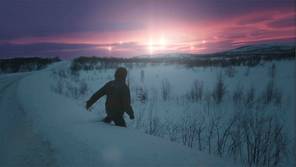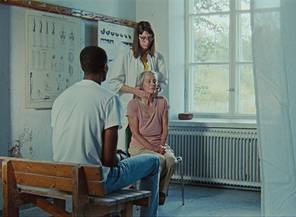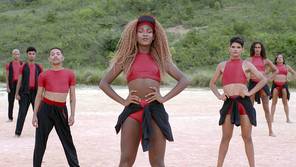Award Winners 2020
International Competition
Jury International Competition: Jihane Chouaib, Roger Alan Koza , Samir Karahoda
Hamburg Short Film Award (3,000 euros)
Sun Dog • Dorian Jespers • Belgium, Russian Federation 2020
Year after year, the number of films is growing exponentially, a quantitative evolution, perhaps unstoppable. But thousands of films do not mean thousands of filmmakers. A filmmaker has one vision of the world and another of cinema; the conjunction of both is revealed in mise-en-scène. From the initial shot to the last, Sun Dog uncovers the existence of a filmmaker behind the camera. Dorian Jespers films with amazing confidence and a thorough knowledge of all that is involved in the materiality of the film itself. A whole tradition is evoked and revived here; Jespers seems to be moving along the paths taken by old masters such as German and Zulawski, names that are typical of a tradition that still shines through in an inimitable filmmaker such as Sokurov. In Sun Dog sound is an autonomous entity and so is image. The meticulous work on the light at night and the sound nuances that make up the soundtrack are admirable. And this is not all, because not only the feat is formal, as the nightly tasks of a locksmith, in an Arctic city of Russia, are enough to introduce dreamlike elements and add to the resulting fantastic turns of the best and past Soviet science fiction. Everything is surprising in Sun Dog. The travellings and the enigmatic subjective shot in which the story is sustained constitute proof of the formal brio that underpins this perceptive adventure and metaphysical fantasy. To give the main award to Jespers' film is simply to witness the arrival of a filmmaker in the history of cinema. Not always does the jury at a festival have such joy.
Deframed Award (2,000 euros) is awarded to a film which deals with reality in a poetic, formal, analytic and unconventional way while ignoring all rules in a pioneering spirit.
Where to Land • Sawandi Groskind • Finnland 2020
The beauty of Where to Land lies in the tenuous mystery that is stated at the beginning and never ceases to tint the story. What happens between a woman who has lost her speech and has chosen to take refuge on an island in solitude and a young man who could well be her son? Where to Land conveys the miracle of communication between strangers and the affection that can come from a mutual understanding without words. A synthetic montage of old photos barely gives a hint of the woman's past, and the way the young man is surfing on the internet in a bar gives an indication of where he comes from. Added to this precise economy of information are some musical passages from Henry Purcell's The Fairy Queen, the title of which is an inescapable sign of appreciation for the film, since part of its mystery lies in its atmosphere (built up, above all, by a whole conception on sound), which invokes vague myths in which the relationship with nature and animals does not necessarily conform to the conventions of science. There are two or three unforgettable passages, such as the shot in which the young man smiles when he hears the woman's "voice" and another when he lovingly brushes her hair in the forest. From these minimal gestures cinema as such remains alive, vindicated here by a 15-minute film, enough to restore faith in fiction.
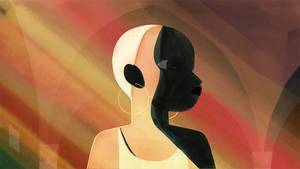
Hamburg Short Film Candidate for the European Film Awards
Genius Loci • Adrien Merigeau • France 2019
Chaos pervades in everything; it permeates the city, lodges in the interstices of each landscape and even reaches the protagonist's own psyche and home order. This is the starting point of Genius loci, a title that refers in its past and philosophical meaning to a dimension of inhabiting, a film whose complex but efficient poetics adopts a principle of permanent mutation, thus forging an powerful aesthetic against the chaos enunciated in the beginning by the young Reine. Adrien Merigeau combines pictorial traditions and sound concepts, and with these he represents the state of mind of his protagonist without leaving the surrounding world out of this singular portrait. In this sense, Genius Loci can be seen as a dream of the protagonist, filmed in living watercolours, of a contained but ostensible elegance, in which the chromatic choices are as beautiful and rigorous as the sounds that sustain the film. It is barely 16 minutes, in which the film vindicates animated cinema, although it would be enough to say only cinema. For these reasons, the jury decided to nominate Adrien Merigeau's Genius Loci for the European Grand Prix.
Special Mention
Huntsville Station • Jamie Meltzer, Chris Filippone • USA 2020
The word freedom has different resonances and always evokes an undeniable value to the ear. No one would ever think of renouncing freedom and even less of questioning its ostensible brilliance and meaning that defines the life of any person. Even so, it is not so simple to define what freedom is, let alone know how to film it. Perhaps the restriction of freedom consists of a shortcut to better intuit what freedom is, and that is why the fact of observing a group of men who can leave prison for a short and limited period of time is enough to better understand what the experience of freedom itself could be. In fact, Meltzer and Filippone are able to portray in less than 15 minutes men leaving a US prison and heading for a bus station. To see them sitting in the sun, waiting for the bus, buying a lottery ticket or a garment or simply feeling that the whole open space embraces them give an image of that experience so difficult to understand and even film: freedom. With the camera, directors conquer such an experience by conjuring up the threat of sentimentality and also any didactic rhetoric. With precision and austerity, freedom is here a concrete atmosphere that flies over each shot. For that reason, more than enough, the jury decided to give Huntsville Station a mention.
German Competition
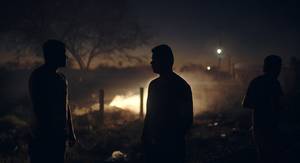
Jury German Competition: Sabine Küchler, Irene von Alberti, Romeo Grünfelder
The Jury Award (2,000 euros)
La Espera • Danilo Do Carmo, Jakob Krese • Germany, Brazil, Netherlands 2020
The title of the film La Espera can be translated as expectation, lurking, and waiting. The first spoken word in the film is “why”. The “why” of the film opens horizons which could hardly be depicted in a more multi-layered way in 14 minutes. Why do people run away? Why are they risking not only their own lives, but those of their children and partners as well? Why are the reasons for this ignored and denied to this day? (To give only two examples: On the one side, you have Asian companies in which European fashion labels have their clothes manufactured under horrible social and security standards or African mines in which children are quarrying rare earths for Western industries under danger of life and limb, while on the other hand, a long over due law for the tracking of supply chains is blocked with spurious arguments). The passage of the train only seemingly provides an end to the waiting. Left behind are those who are injured, maimed, scorched, hunted, and beaten by the border police, whose children are abducted and whose future remain uncertain. But those who rather wait than fight the causes of mass migrations and watch as dinghies drown and “transit camps” burn down are left behind as well. Instead, La Espera shows campfires and burning straw. In general, the film takes place in an aesthetic twilight zone, in the magically picturesque time of transition between day and night. The protagonists, of which we barely see more than fleeting silhouettes at the campfire, retain their voice. Masks in front of the background of the promised “Wild West”, where real men are enjoying strong tobacco and a cup of coffee at the campfire after strength-sapping cattle run. Wild West? Evening sun? Campfire? This cliché is sharpened to the aesthetic threshold of pain by the colourful headlights of the passing trucks, which roll as a caravan of the unbridled movement of goods through the entire film, across all borders. It is reminiscent of the long gone promise of salvation of a naively romantic cinema with Yugoslavian Winnetou sceneries in Mad Max wide screen. A type of cinema a lot of people still wistfully yearn for. Something is wrong here and that convinced us, the jury, to give the award to La Espera.
Special Mention:
[Bordeaux], ma bile • Oliver Bassemir • Germany, France 2019
The situationistically informed film feels like it fell out of time, driven out of Bordeaux’s inner city like the film maker himself. In the city’s most inhospitable banlieues, he faces fundamental observations which no longer seem worth of being observed.
Die sehen ja nur, die wissen ja nichts • Silke Schönfeld • Germany 2020
In search of the boundary between cinematic picture and reality, the film sensitively approaches a girl making her way in male dominated martial arts and gets impressively close to her in the process. The film maker neither evokes the migrant background of her environment nor does it summon up a heroic myth. Instead, it guides our view into a world which we did not know existed in this way.
Scenes from Trial and Error • Tekla Aslanishvili • Germany, Georgia 2020
The film focuses in an unconcluded manner on the ambivalent portrayal of a failed project at the Black Sea. After years of occupation by diverse interests, the film shows us the dynamic of decisions and the subsequent decline of a bizarre utopia with quirky strength.
Serial Parallels • Max Hattler • Germany, Hong Kong 2019
In the projector, the individual images combine along imaginary, parallel running perforation holes of the film to a staccato of shots and montages of urban tower blocks. Serial Parallels displays the connection of technical film history and serial architecture in an extremely austere formality which is frequently interrupted by the signs of inhabitants in individual frames.
Three-Minute Qickie: Unknown Territories
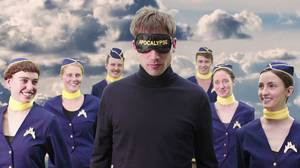
Der Wettbewerb "Flotter Dreier" wird gefördert von der Hamburgischen Kulturstiftung. Der Publikumspreis ist mit 1.000 Euro für den Gewinnerfilm dotiert.
Apocalypse Airlines • Franziska Unger/Camille Tricaud • Deutschland 2019
Es war knapp an der Spitze, der zweite Platz geht an "La mer á boire - Sea to drink" von Charlotte Arene, dicht gefolgt von "Weisser Fleck . The White Stain" von Gregor Stockmann auf dem dritten Platz.
All competitions
The competition spanning ARTE Short Film Award consists of the purchase of one film (up to 6,000 euros) and its subsequent screening in the »Kurzschluss« programme by ARTE, the Franco-German cultural TV channel.
Swinguerra • Bárbara Wagner, Benjamin de Burca • Brazil 2019
The artist duo Wagner & De Burca manages to realize the authenticity, physicality and directness of a political and social reality with great efficacy. Dance becomes a means for expression. Dance and popular culture as democratic voice. In the choreography which they had developed together with their dancers, Wagner & Burca convey a plan for the future of the country Brazil. Swinguerra receives the ARTE Award 2020. Congratulations.
 Shortfilm Festival Archive Hamburg
Shortfilm Festival Archive Hamburg